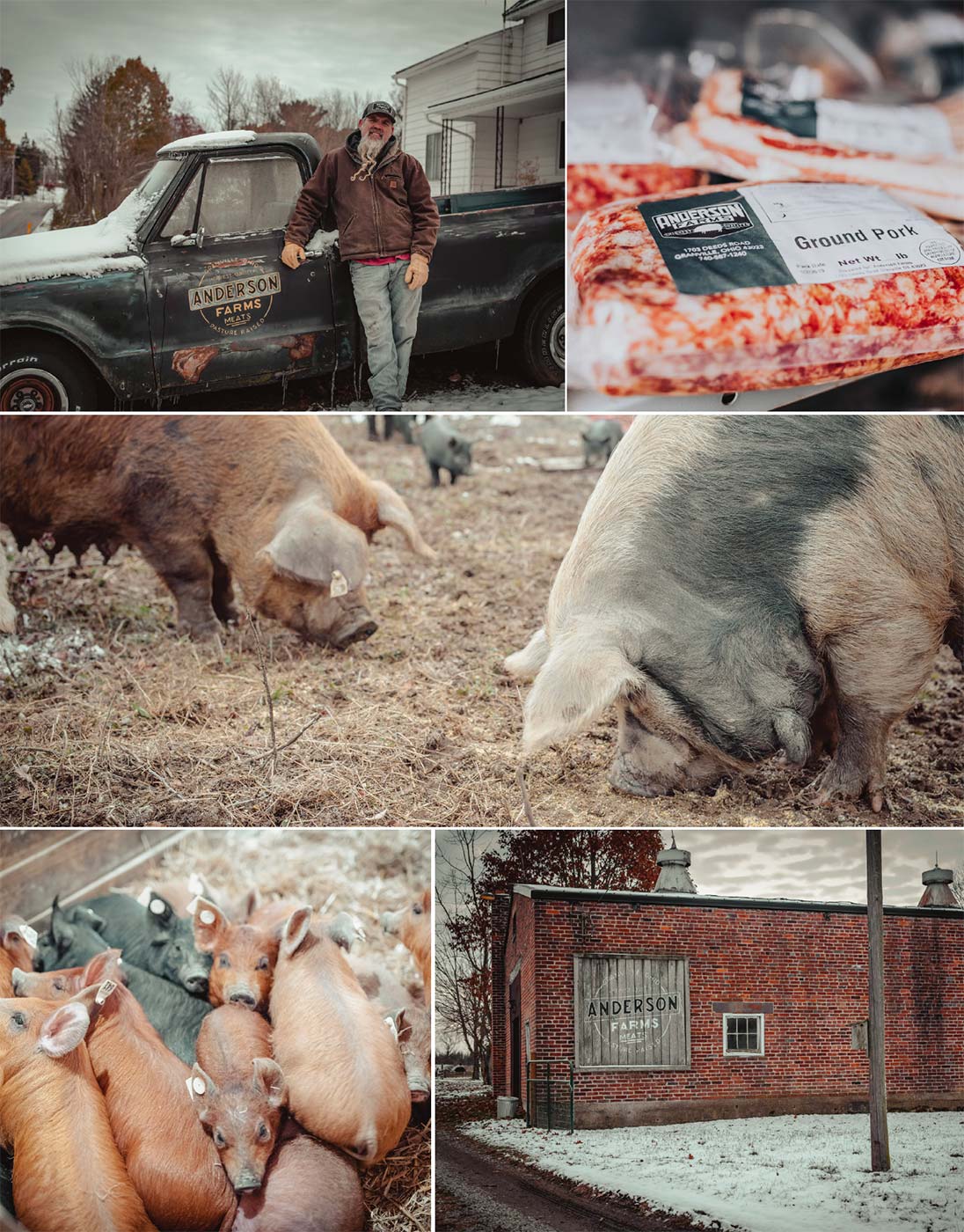Porcine Paradise
While most people would be happy to be the founder of one of the most successful barbecue operations in Columbus, that was not enough for James Anderson, owner of Ray Ray’s Hog Pit. While he has been cooking professionally since he was 14 and, by every measure, is extremely successful, he decided to add “farmer” to his resume. Five years ago he started Anderson Farms in Granville.
Since his first love is the barbecue pit, he decided to raise pigs to market locally through restaurants, grocery stores and his own barbecue joints. “I wanted to complete the circle and give myself a competitive edge by providing the highest-quality pork with the best flavor profiles,” he said.
Producing outstanding pork has a lot of parallels to producing outstanding barbecue. It takes time, a sense of pride and a commitment to quality. Additionally, raising pigs and selecting for desired traits is similar to creating a recipe. Through the mixing and matching of genetics you can produce a recipe that will yield a hog with the desired attributes. Some combinations produce pork with exceptional belly fat while others are prized for their marbling that produces beautiful charcuterie products. For James it is about raising heritage breeds of pigs that offer different qualities and characteristics in their meat than you will find in the pork at your local grocery store.
Heritage breeds, as the name suggests, are predecessors to the modern breeds. In many instances these breeds have retained characteristics of their wild ancestors, such as hardiness and foraging abilities. At the turn of the last century, on farms across the Midwest you could find the same varieties that James currently raises, including Mule Foot, Red Wattle and Berkshire. These staples of the farm were simply turned out in a woodlot to root, forage and raise their young. The production method required little input from busy farmers. These pigs thrived and, although they had much slower rates of growth, produced excellent pork and lard.
As farming evolved, these breeds fell out of favor for a variety of reasons, including temperament, slow growth rate or lack of availability. Keeping heritage breeds means adjusting to the conditions that are best suited for their husbandry: raising them outdoors and allowing them to forage and root for food. By contrast, today’s large pig farms typically keep their pigs confined in barns.
“I had zero background in farming and spent about a year just studying the techniques,” James said. “Talking with older generations of farmers that used to raise pigs like this was the most helpful.” Many of the heritage breeds James raises are rare, so it’s a challenge to find suitable breeding stock. He has gone as far as Michigan and Illinois to secure breeding stock that is not locally available.

Anderson Farms now has more than 200 pigs that are completely free range. They are able to cruise their paddocks and exhibit natural pig behavior such as rooting and, yes, wallowing in mud. Their diet is supplemented with corn and soybeans to ensure proper nutrition and overall healthy body conditions. Pigs are naturally social animals and that makes them susceptible to communicable diseases. Sick pigs are treated with medication, and James tries to build up the herd’s immune system naturally instead of administering antibiotics through their feed.
Patience is key for this method of farming. Pigs raised on pasture develop more slowly than their conventionally raised counterparts. While market standards have pigs being processed at around 250 pounds, James runs counter to that notion and strives for a market weight of 300 to 325 pounds. “Fat equals flavor and the fat from pasture-raised pork is sweet, delicate and flavorful, so a little more fat never hurts,” he said.
These breeds possess the attributes capable of producing the finest pork—both succulent and deeply marbled—that is highly sought out by discerning chefs and customers. Although it might be counterintuitive, the best way to save these heritage breeds is to eat them. Barbecue enthusiasts and charcuterie adventurers owe it to themselves to research and seek out pork sourced from these breeds, as well as the producers who are choosing quality over quantity. Promotion and increasing awareness bolsters the reputation of these breeds. Increasing the demand will continue to give farmers, like James, good reason to take the time to raise and promote them.
Just as farming has evolved, so too have consumer preferences. Barbecue is immensely popular, with food trucks and restaurants striving to meet demand. However, animal protein is losing its position as the gold standard for healthy nutrition. Burgers are switching to black beans and chicken nuggets are going soy. At a time when both restaurant menus and meat cases are featuring more plant-based protein, barbecued ribs and smoked pork belly seem to not have noticed and the barbecue pit has remained true to form.
“There is something primal about hanging out by the grill,” says James, who like his father is carrying on the family tradition of barbecue.
Waking up to feed pigs and prepare barbecue everyday has James in no rush to grow either the farm or Ray Ray’s, which has locations in Clintonville, Franklinton and Westerville. “Quality comes before growth. I have to earn what comes next,” James said. To ensure consistent quality, James is very satisfied with the current size of his farming operation. By maintaining its current production level he is able to guarantee that he is producing top products for customers who hold his pork in such high regard.
Anderson Farms is securing a future while preserving history with every heritage piglet born. If a wild animal were threatened with extinction, we would quickly act to conserve and protect it. The same thought can be applied to domesticated farm animals that are facing obsolescence within agriculture. These unique breeds are deserving of our guardianship so that they are not lost to history. Luckily for us, we can help save these heritage breeds every time we eat barbecue.
Find Anderson Farms online at andersonfarmsohio.com. For more information about the locations and hours of Ray Ray’s Hog Pit, visit rayrayshogpit.com.





